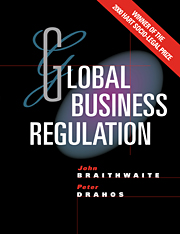16 - Food
Published online by Cambridge University Press: 04 August 2020
Summary
History of Globalization
The Rise of Victorian Central State Regulation
The laws of Moses include proscriptions on food similar to some features of modern food laws (see Leviticus 17: 24; Deuteronomy 25: 13-15), features whose globalization was doubtless assisted by the widespread influence of the Bible. The most systematic ancient treatment of food law is found in the Roman civil law, which had a particularly strong emphasis on weights and measures, labelling, economic loss and fraud (Hutt & Hutt 1984: 6-7). This had an early influence across the Roman empire into the laws of future European imperial powers. In England, the Magna Carta (1215) laid the most important foundation for the law of weights and measures in common-law countries. Private law such as in England's common law has encompassed cases of food adulteration (e.g. putrid cheese) as well as false claims about weights and measures since the thirteenth century (Hutt & Hutt 1984: 22). From at least 1200 in Europe guilds sought to regulate food in the interests of consumers and honest traders, and doubtless at times in ways that protected monopolies for guild members, at least in some cities (Fallows 1988: 29; London Food Commission 1988: xi; Thompson 1996: 1).
State regulation of food adulteration blossomed surprisingly late, though in England the Assize of Bread nationally regulated the amount of flour per pound of bread from 1266, with administration in the hands of local justices of the peace (Guyer 1993: 802). Scarce and costly foods were subject to some regulation in England during the eighteenth century by laws such as the Adulteration of Tea and Coffee Act 1724. An important event in England was the publication of EC. Accum's (1820) Treatise on Adulteration of Food and Culinary Poisons, which for the first time demonstrated the adulteration problem through chemical analysis and called for state regulation. That took forty years. The Lancet Analytical and Sanitary Commission of 1851-54 was important in building professional and public concern, as was the Parliamentary Select Committee of Inquiry into Adulteration of 1855-56 (Paulus 1974). A Bill introduced in 1857 was withdrawn in response to industry opposition. However, anti-adulteration pressure groups such as the Social Science Association in Birmingham kept up pressure until an 1858 outbreak of food poisoning in Bradford afflicted 200 people, seventeen fatally, thereby prompting legislative change (Burke 1980: 26).
- Type
- Chapter
- Information
- Global Business Regulation , pp. 399 - 417Publisher: Cambridge University PressPrint publication year: 2000



